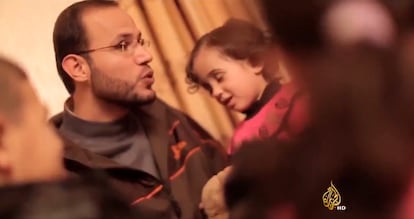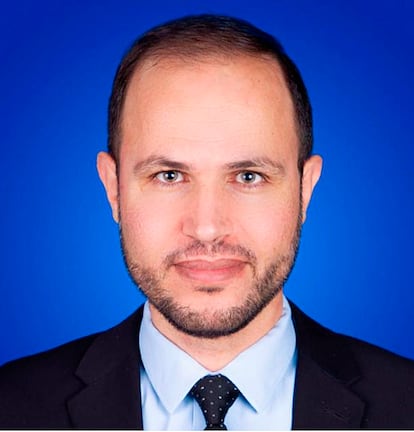Palestinian professor who reported on Gaza’s suffering dies before replying to final message
Refaat Alareer, the teacher and writer who had shared the hardships of war with EL PAÍS, was killed along with six family members in an Israeli attack


“Hello Refaat, I just wanted to know how you and your family are doing...” The last message sent to Refaat Alareer on December 6 went unanswered. The next day, several acquaintances posted on social media about the death of the Palestinian professor, writer and father of six children, during an Israeli bombing in Gaza City. A close friend later confirmed to EL PAÍS that Alareer died in the house where he was taking refuge, and that a brother, a sister and four of his children also lost their lives in the attack. According to local authorities, the death toll in Gaza now exceeds 17,000. We’re told Alareer’s wife and two children are safe.
Two days before his death, Alareer posted on X (formerly Twitter) that he was moving again due to intense bombings in the Shujayia neighborhood, and expressed concern for several children and relatives who were trapped there. In an interview with EL PAÍS, Alareer said, “They are sending Gaza back a hundred years,” and argued that the international community is “complicit” in the “extermination” being carried out by Israel. Due to communication issues, the professor sent us recorded voice messages with the sound of Israeli bombs and drones in the background.
Alareer, a literature professor with the Islamic University of Gaza, warned us a month ago about how Israel is using “hunger as a weapon of war.” The Gaza Strip is facing major hunger issues as it enters the third month of the war instigated by the October 7 Hamas attack that killed 1,200 people in Israel. “The people of Gaza are dying of hunger,” said Alareer. “We have very little food or water due to Israel’s blockade. This is a systematic extermination – the ethnic cleansing of Palestinians in Gaza. It’s a continuation of the Israeli ethnic cleansing that started over 75 years ago,” referring to the creation of the Israeli state in 1948.
Alareer’s death marked the abrupt end to his reports on social media and interviews with various media outlets. The professor had justified the October 7 Hamas attack to the BBC, calling it a “legitimate” act of resistance. The Israeli press also reported on his death, criticizing his public comments. His controversial stance on social media allegedly prompted Israel to carry out the “deliberate” attack on his life, said the friend who told us about his death. Western and Arab countries “want Palestinians to stay quiet, to not demand our freedom,” Alareer said in our interview a month ago.
Alareer described life in Gaza under the siege that ultimately killed him as a daily struggle for the most basic needs. “A desperate friend of mine is giving her children energy drinks due to the lack of water. Many people are falling ill from consuming contaminated water,” he said. “We have a few cans of food left that can probably last a week. We’re eating less than a quarter of what we used to. I haven’t showered in 10 days to save water and 90% of Gaza’s water is not drinkable... Israel has attacked everything we need to survive – bakeries, ambulances, U.N. organizations, schools, universities, hospitals, roads, power and water lines.”
A decade ago, Alareer edited a book of 15 stories by young Gazan writers about Israel’s 2008 military operation in Gaza, known as Operation Cast Lead. He was also one of the founders of the We Are Not Numbers website that tells the human stories behind the numbers in the news.
Buzzing drones overhead
“Last night [November 5], we experienced our worst night so far. They bombed just ten meters away from where we were staying. Israel usually intensifies the bombing at night... Nights in Gaza are absolute hell.” The day before, Alareer said Israel had cut them off, and surrounded them by “terror” the likes of which they had never experienced in Gaza.
At times, Alareer’s voice broke off to warn people about the drones buzzing over the house, which he described as a psychological assault. “It breaks my heart to see children suffering the most. The screams and the tears... It’s overwhelming, and all I want to do is cry. I’m a father and also a teacher. I have 200 students whom I deeply care about. I try my best to protect them and provide everything they need. But when it comes to protecting myself, I feel helpless. How can I protect my children? Where are we supposed to go?” he asked rhetorically, knowing there is no answer.

“The Israelis have vowed to destroy Gaza, to turn it into a parking lot with a city of tents. They want to push the Palestinians into the sea and into the Sinai Desert,” said Alareer, commenting on the plan advocated by some Israelis to force Gazans into Egypt. Alareer believes Israel intends to do more than just eradicate Hamas. “It’s a systematic approach – 90% of the people have been killed in their homes while they were sleeping. Israel pushes people from their homes, so they go to schools for refuge. But then Israel bombs the schools, so they end up in hospitals. But Israel bombs those too.”
“This is unprecedented,” he insisted, stressing the lonely abandonment of the Palestinians by “the whole world,” with the United States, the United Kingdom and Germany supporting Israel. “This is not a war. This is extermination. It must be called genocide – it’s a textbook example of genocide,” said Alareer.
Since journalists cannot enter Gaza, we communicated with Alareer by phone, who often resorted to sending recorded voice messages when communications were cut off. “I am currently hiding out with my family and some relatives. We had to relocate multiple times after our house was bombed two weeks ago. There were about 30 people with us, including 25 children and women. We sought shelter in a school, but had to move. Sadly, a missile killed a neighbor and her two daughters in their kitchen while they were preparing lunch.”
On a few occasions, Alareer talked about other subjects. “Hey, since you’re Spanish, let people know I’m a fan of Barça. Visca Barça! Soccer is my passion, you know? Even during the bombing I’m checking the Spanish league scores.” Then he thanked those who were brave enough to defend the Palestinians on the international stage, like the “Spanish government folks whose names I can’t remember right now.” Perhaps he was referring to Ione Belarra and Irene Montero. Just as he was about to say more, another blast in the background cut him off.
In Alareer’s final post on X two days before his death, he again said the United States, the Democratic Party and President Joe Biden were all accomplices to the “Israeli genocide in Gaza.” Pinned above that post, like a dark premonition, is his poem, If I Have to Die.
Sign up for our weekly newsletter to get more English-language news coverage from EL PAÍS USA Edition
Tu suscripción se está usando en otro dispositivo
¿Quieres añadir otro usuario a tu suscripción?
Si continúas leyendo en este dispositivo, no se podrá leer en el otro.
FlechaTu suscripción se está usando en otro dispositivo y solo puedes acceder a EL PAÍS desde un dispositivo a la vez.
Si quieres compartir tu cuenta, cambia tu suscripción a la modalidad Premium, así podrás añadir otro usuario. Cada uno accederá con su propia cuenta de email, lo que os permitirá personalizar vuestra experiencia en EL PAÍS.
¿Tienes una suscripción de empresa? Accede aquí para contratar más cuentas.
En el caso de no saber quién está usando tu cuenta, te recomendamos cambiar tu contraseña aquí.
Si decides continuar compartiendo tu cuenta, este mensaje se mostrará en tu dispositivo y en el de la otra persona que está usando tu cuenta de forma indefinida, afectando a tu experiencia de lectura. Puedes consultar aquí los términos y condiciones de la suscripción digital.








































